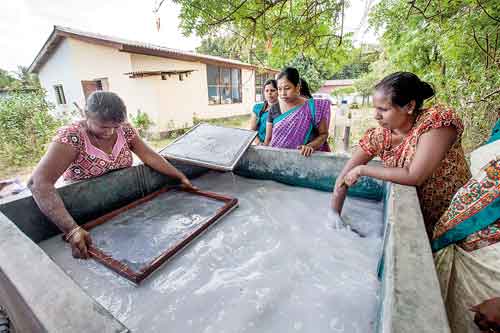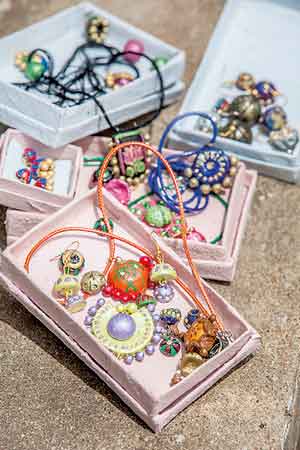From handmade recycled paper to beautiful crafts

Making paper: Women working together at the Ranapuram centre
The women stand by a small cement water tank. They work together, transferring thin layers of the watery pulp onto mesh squares. Occasionally, small, white kohomba flowers from tree branches above fall into the tank and become part of the blend. Nobody minds. The wet sheets of pulp—now studded with tiny blooms—are carefully peeled off their frames, pressed and dried on clotheslines. What emerges at the end of the process is a sheet of handmade, recycled paper. It is ready now to be turned into a wonderful array of Sri Crafts products: cards, and boards; boxes, photo frames and notebooks.
Sri Crafts is an inclusive enterprise of Community Based Rehabilitation in Sri Ramapuram, a relocated village in Vavuniya in the Northern Province. The group were offered training and provided basic equipment through a European Union Support to District Development Programme (EU-SDDP) implemented by the UNDP.
They are one of several producer groups falling under a newly minted Economic Advisory Service Unit at the Vavuniya Divisional Secretariat. The unit has multiple responsibilities, including capacity building, business mentoring and supporting producer groups like this one. They also provide the raw materials Sri Crafts needs.
Having learnt the art of waste sorting and separation, each department of the Vavuniya Divisional Secretariat sends heaps of discarded paper and documents to the Sri Craft workshop, where it is blended with locally sourced fibre and made into cards.
Today, 26-year-old Priyar-darshani Balasubramaniam has come to work early. She is one of seven members in this producer group in Sri Ramapuram. They are all between the ages of 21 and 45, and each has a disability. Priyadarshani is unable to use one hand and one leg, and must find creative ways of working. She has been trained by the NGO SEED to manipulate strips of coloured paper into the shapes of flowers, leaves and animals – all using one hand.
Priyadarshani’s fingers are quick and agile as she braces a pink strip against her stomach and twists it into shape. She still needs assistance sticking her intricate decorations on to the recycled paper, but there is no shortage of help.

Intricate terracotta jewellery. Pix by Suda Shanmugaraja
“I like coming here because I can get support from others,” she says, smiling shyly. “It makes me happy to work.” Priyadarshani feels keenly the burden her disability places on her family, and so it is with pride that she recounts going up to her father with her paycheck. “I can now pay for some of my medical expenses,” she told him.
The products made in this small workshop appear in markets in Colombo, but they have also made it as far as New York City, where they were featured as part of an NGO CSW Artisan Fair in March, 2017.
What makes the project innovative is their willingness to experiment, says K. Sarathanjali, Asst. Divisional Secretary at the Vavuniya Divisional Secretariat. “We do not import our raw materials,” she says, explaining that instead of relying on deliveries from other parts of the island or even further afield, they turn to the land around them for what they need. Marigold and turmeric provide a vivid yellow dye; tea leaves a shade of brown; beetroots and tomatoes are good for pinks and reds. They have found that mixing the pulp of the kohomba tree into the paper prevents the growth of fungus and that water hyacinths are a great source of natural fibre. “Our only guide has been what we could find on the internet,” says Sarathanjali, who is pleased to see the producer group attempting something unique in Sri Lanka.
Currently, the small team produces approximately 800 boards and 500 sheets every month. Producers are paid based on fixed prices for different forms of labour such as cutting sheets or sifting pulp. For the producer group’s disabled members, this is a rare source of income, but perhaps even more crucially, it is a place to make friends and find support.
Such innovative industries could help improve livelihoods and boost a culture of entrepreneurship in Vavuniya, says K. Uthayarajah, the Divisional Secretary for the area. His office oversees 42 gramasevaka divisions which are home to an estimated 35,000 families. “We hope to ensure the sustainability and continuous support for entrepreneurs under our project,” he says, explaining that post-war many families returned to resettle here. They now need work. Going forward, Uthayarajah hopes to see Vavuniya realise its potential as the gateway to the Northern Province.


